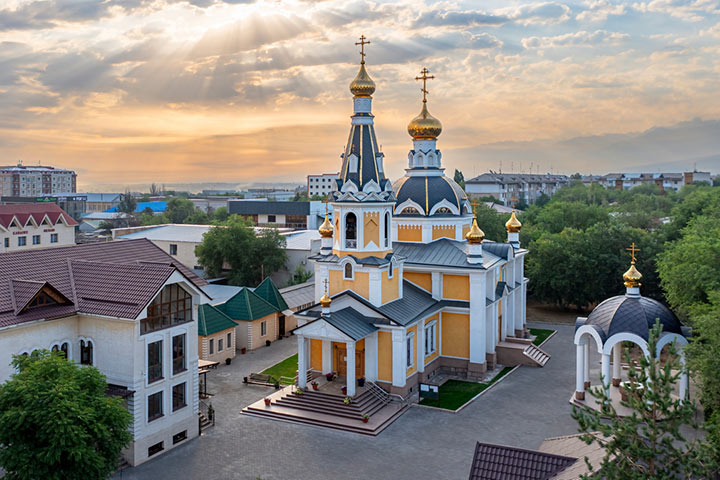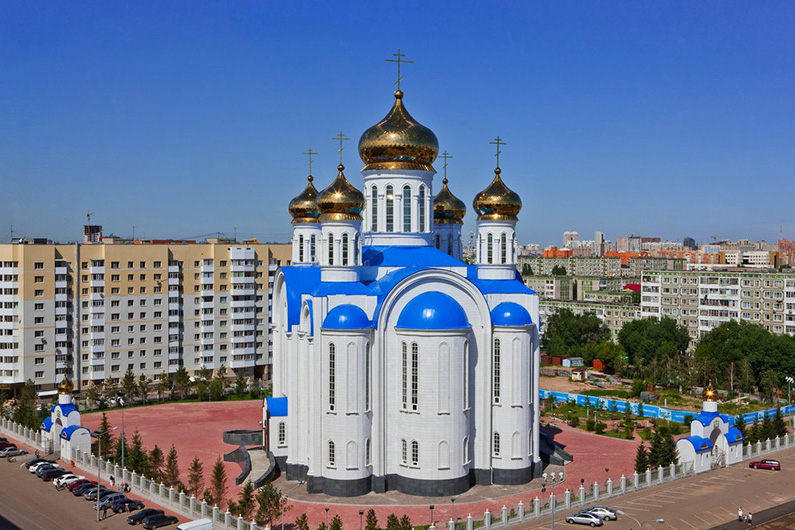
The feast of feasts and the Triumph of celebrations - the Bright Resurrection of Christ. Metropolitan Alexander performed a festive service in the main church of Alma-Ata
- 05.05.2024, 10:39
- Новости на английском языке

On the night of May 4-5, 2024, the Orthodox believers of Kazakhstan celebrated the Feast of Feasts and the Triumph of celebrations - the Bright Resurrection of Christ, the saving Easter of God.
The head of the Kazakhstan Metropolitan District, Metropolitan Alexander of Astana and Kazakhstan, performed festive Easter services at the Ascension Cathedral of Almaty.
Concelebrating with the Primate of the Orthodox Church of Kazakhstan were: the confessor of the Alma-Ata diocese, Archimandrite John (Sazonov), the head of the District's public relations department, Archpriest Alexander Suvorov; heads of departments and commissions of the Metropolitan District in holy orders; cathedral clergy.
During the Easter service the following people prayed: employees of the Alma-Ata diocesan administration, patrons of the diocese, and numerous believers.
The chants were performed by the choir of the Kazakhstan Metropolitan District under the direction of the Honored Artist of Russia O.N. Ovchinnikov and the choir of the Ascension Cathedral under the direction of N. Zubrevich.
Three hours before the start of the service, the book of the Acts of the Apostles was read in the cathedral. “The best proof of the truth of the Resurrection of Christ are the miracles performed by the Apostles, and the book of Acts is nothing more than a narrative about the miracles of the Apostles,” says St. John Chrysostom about this ancient custom.
The Easter service began with the Midnight Office with the canon of Great Saturday “Wave of the Sea” in front of the Shroud of the Savior located in the middle of the temple. While singing the final irmos, “Do not weep for Mene Mati,” the clergy, with the words “I will arise and be glorified,” lifted the shroud from the tomb standing in the center of the temple and carried it to the altar. Here, on the holy throne, she will rest until the Ascension - in memory of the forty-day stay on earth of the Risen Lord.
At the end of the Midnight Office, accompanied by the singing of the stichera “Thy Resurrection, O Christ the Savior,” a procession of the cross was held around the cathedral. Easter Matins continued with the singing of the Easter canon, compiled in the 8th century by the Monk John of Damascus. After the end of the canon, the clergy and choir sang the stichera of Easter. Next, the “Catechetical Sermon of St. John Chrysostom” was read, in which all believers are called to enjoy the bright celebration and enter into the joy of the Risen Lord.
During the singing of the Easter hours, the clergy changed their white vestments to red ones.
In accordance with the liturgical Rules, during the Liturgy of the Feast of the Resurrection of Christ, special antiphons are performed, consisting of prophetic psalms: the 65th “Shout to the Lord, all the earth” with the refrain “Prayers of the Mother of God, Savior, save us”, the 66th “God be gracious to us and bless us” ” with the chorus “Save us, Son of God, risen from the dead, singing Ti: hallelujah” and the 67th “May God rise, and His enemies be scattered” with the chorus - the troparion of the holiday “Christ is risen from the dead, trampling down death by death...”. Instead of the Trisagion, the baptismal hymn was sung at the Liturgy: “The Elites were baptized into Christ...”, in remembrance of the ancient tradition of baptism of catechumens on this day.
The beginning of the book of the Acts of the Apostles was read (Chapter 1, verses 1 to 8) and the Gospel concept about the Divine nature of the Lord Jesus Christ, who in the Resurrection from the dead revealed His Divine power to the world (Gospel of John: Chapter 1, verses 13-17). According to ancient tradition, the Easter Gospel at the night Divine Liturgy was read in several languages. Metropolitan Alexander began reading in ancient Greek, then the concelebrating clergy continued reading in: Latin, Kazakh, Hebrew, Aramaic, English, Russian, Mordovian, Italian and Church Slavonic. Easter greeting “Christ is Risen!” also on this day it is pronounced in different languages and dialects, ancient and modern, to commemorate the worldwide triumph of the Christian gospel of the resurrection of Christ the Giver of Life from the dead.
During the Liturgy, a message from the Primate of the Russian Orthodox Church, His Holiness Patriarch of Moscow and All Rus' Kirill, was read out.
Following the prayer behind the pulpit, Vladyka Metropolitan consecrated the artos and after the end of the service he addressed all those gathered with words of Easter greeting, after which he blessed the Easter meal: Easter cakes, Easter cottage cheese, colored eggs.
The Easter service was broadcast on a widescreen screen installed on the square in front of the cathedral. Before the start of Matins, documentaries from the Semirechye television studio (director - Honored Cultural Worker V.L. Posadneva) were shown on the screen.
Representatives of the Semirechye Cossack Union, led by Ataman Shikhotov V.S., took an active part in ensuring order and security.
The video recording of the metropolitan service was carried out by the television studio of the Kazakhstan Metropolitan District “Semirechye” (cameraman - A. Schmidt); photographic recording by employees of the information department I. Burenin and A. Sheglov.





















